With the turn of the calendar into a new year comes the pressure to create and stick to a resolution. The topics of conservation and environmental impact are top of mind for many this time of year. Here are 5 easy environmentally friendly modifications you can implement in your landscape. These changes require less than 5 minutes of your time but yield significant results.
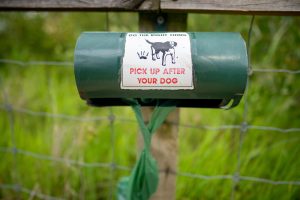
1. Pick up pet waste
Pet waste is a major contributor to stormwater pollution. It can introduce harmful organisms, disease and bacteria into soil and groundwater. When it rains, bacteria from pet waste can wash directly into storm drains, retention ponds, or drainage ditches and eventually into the St Johns River. Scoop that poop! Whether in your own backyard or a public street or park, always bag it and throw it in the trash or collect it and flush down the toilet.
2. Aim downspouts at the yard, not the driveway
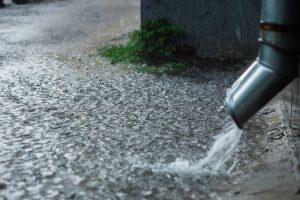
Ideally, the rain that falls in your yard should soak into your yard. A 1” rain storm creates a whopping 623 gallons of runoff from a 1,000 square foot roof! Redirect all this runoff away from impervious areas such as concrete sidewalks, driveways, and pavement onto pervious natural or landscape areas. Disconnecting the continuous path of impervious surfaces towards the storm drains gives the opportunity for stormwater to be filtered through the soil before it reaches the waterways.
3. Turn your irrigation to manual and only water as needed
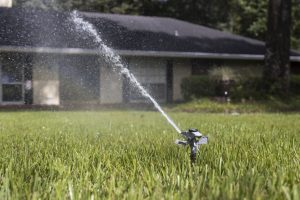
Turf grasses don’t need as much water as we think they do, and appropriately placed established trees and shrubs shouldn’t need any supplemental watering except in cases of long term drought. When it comes to irrigation, many homeowners “set it and forget it” and over water their lawns, damaging or even killing turf and plants. Too much water encourages weed, insect and disease problems and shallow roots. Turf depends on deep roots to stay healthy and to survive dry spells. Watering less frequently for longer periods of time will encourage deeper rooting.
A lawn will tell you when it’s time to water by showing at least one of the three signs of wilt:
-Folding leaf blades
-Blue-gray color
-Footprints remain visible
Unless rain is forecast in the next 24 hours, irrigate your lawn with ½ to ¾’ of water only when 30% or more shows wilt.
4. Sweep or blow grass clippings back into the lawn
This will prevent them from traveling to the storm drain and eventual contact with water. Grass clippings contain a lot of nitrogen, and when there is too much of it, it leads to the growth of algae in our water bodies. Bonus-leaving them on the lawn will improve soil health.
5. Check plants for invasiveness before planting
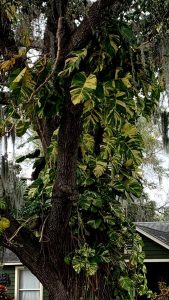
The beautiful plants you got at your local garden center may look nice in your yard, but by planting them you might be inviting bad acting non-native invasive species in. Invasive plants can quickly multiply and escape your yard spreading to other areas where they’ll be biopollution-an ecological and economic nightmare. Save the headache and check the UF/IFAS Assessment before buying and avoid planting anything with a red indicator box after its name.
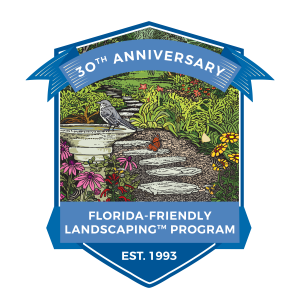
2023 marked the 30th anniversary of the Florida-Friendly Landscaping Program.
To celebrate this milestone, sign the Florida-Friendly Landscaping Pledge to implement just one of these changes in your landscape. Every small change will add up to a cumulative greater good. In conclusion, implementing these 5 easy fixes, such as picking up pet waste, redirecting downspouts, adjusting irrigation, managing grass clippings, and checking for plant invasiveness, can have a significant positive impact on the environment and protect natural resources. Share this with a friend who will be happy to learn it’s easy to be Florida-Friendly this year!
For more information about the Florida-Friendly Landscaping Program in Duval County contact the Extension Office at (904) 255-7450.
 4
4
